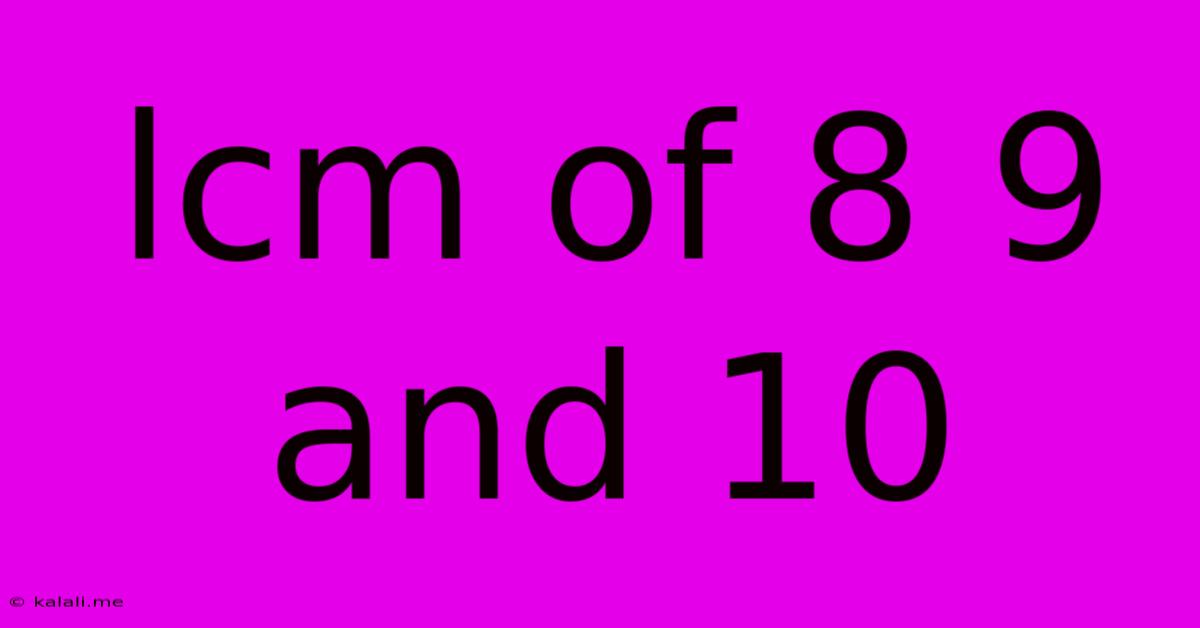Lcm Of 8 9 And 10
Kalali
Jun 15, 2025 · 3 min read

Table of Contents
Finding the Least Common Multiple (LCM) of 8, 9, and 10
This article will guide you through calculating the least common multiple (LCM) of 8, 9, and 10. Understanding LCM is crucial in various mathematical applications, from simplifying fractions to solving problems involving cycles or repeating events. We'll explore several methods to find the LCM, making this concept accessible to everyone.
What is the Least Common Multiple (LCM)?
The least common multiple (LCM) of two or more integers is the smallest positive integer that is divisible by all of the integers without leaving a remainder. Think of it as the smallest number that contains all the numbers in the set as factors. For instance, the LCM of 2 and 3 is 6, because 6 is the smallest number divisible by both 2 and 3.
Methods for Finding the LCM of 8, 9, and 10
We'll explore two common methods to determine the LCM of 8, 9, and 10:
1. Prime Factorization Method
This method is generally preferred for larger numbers or sets of numbers. It involves breaking down each number into its prime factors.
-
Prime Factorization:
- 8 = 2 x 2 x 2 = 2³
- 9 = 3 x 3 = 3²
- 10 = 2 x 5
-
Finding the LCM: To find the LCM, we take the highest power of each prime factor present in the factorizations:
- The highest power of 2 is 2³ = 8
- The highest power of 3 is 3² = 9
- The highest power of 5 is 5¹ = 5
-
Calculate the LCM: Multiply these highest powers together: 8 x 9 x 5 = 360
Therefore, the LCM of 8, 9, and 10 is 360.
2. Listing Multiples Method
This method is straightforward for smaller numbers but can become cumbersome with larger numbers. It involves listing the multiples of each number until a common multiple is found.
-
Multiples of 8: 8, 16, 24, 32, 40, 48, 56, 64, 72, 80, 88, 96, 104, 112, 120, 128, 136, 144, 152, 160, 168, 176, 184, 192, 200, 208, 216, 224, 232, 240, 248, 256, 264, 272, 280, 288, 296, 304, 312, 320, 328, 336, 344, 352, 360...
-
Multiples of 9: 9, 18, 27, 36, 45, 54, 63, 72, 81, 90, 99, 108, 117, 126, 135, 144, 153, 162, 171, 180, 189, 198, 207, 216, 225, 234, 243, 252, 261, 270, 279, 288, 297, 306, 315, 324, 333, 342, 351, 360...
-
Multiples of 10: 10, 20, 30, 40, 50, 60, 70, 80, 90, 100, 110, 120, 130, 140, 150, 160, 170, 180, 190, 200, 210, 220, 230, 240, 250, 260, 270, 280, 290, 300, 310, 320, 330, 340, 350, 360...
As you can see, the smallest common multiple among these lists is 360.
Conclusion:
Both methods yield the same result: the LCM of 8, 9, and 10 is 360. The prime factorization method is generally more efficient for larger numbers, while the listing method is easier to visualize for smaller sets. Understanding the LCM is a fundamental skill in mathematics with applications in various fields.
Latest Posts
Latest Posts
-
Countries Through Which Tropic Of Cancer Passes
Jun 15, 2025
-
How Many Hockey Players In A Team
Jun 15, 2025
-
In What Way Are Classical And Operant Conditioning Distinct
Jun 15, 2025
-
Which Of These Statements Is True About Xml
Jun 15, 2025
-
The Four Pillars Of Democracy Are
Jun 15, 2025
Related Post
Thank you for visiting our website which covers about Lcm Of 8 9 And 10 . We hope the information provided has been useful to you. Feel free to contact us if you have any questions or need further assistance. See you next time and don't miss to bookmark.